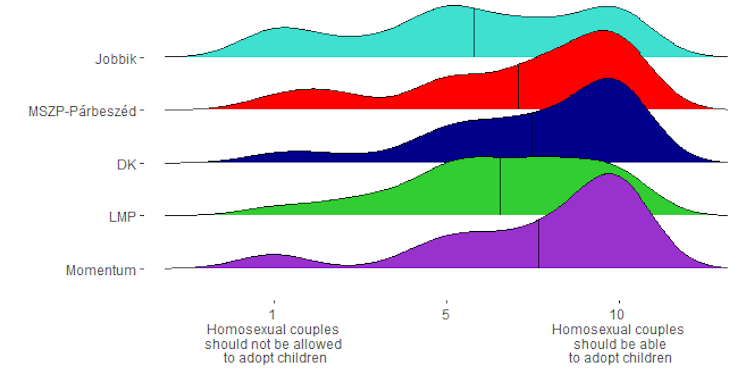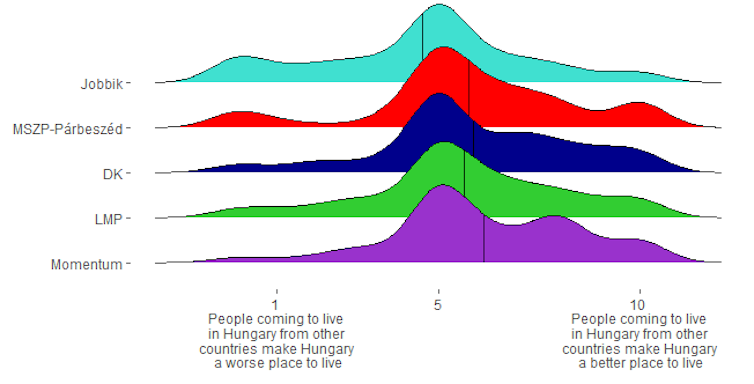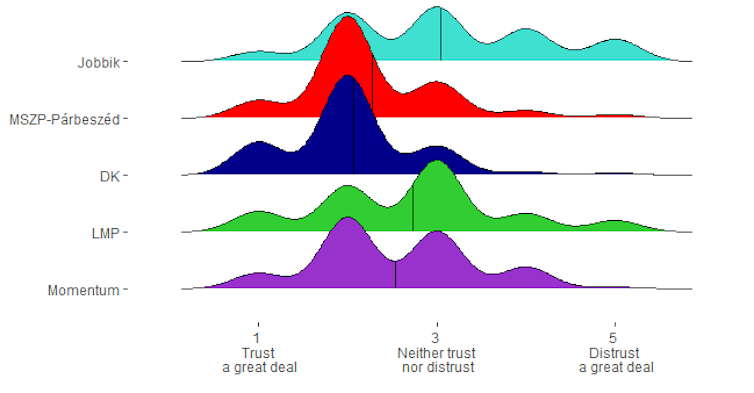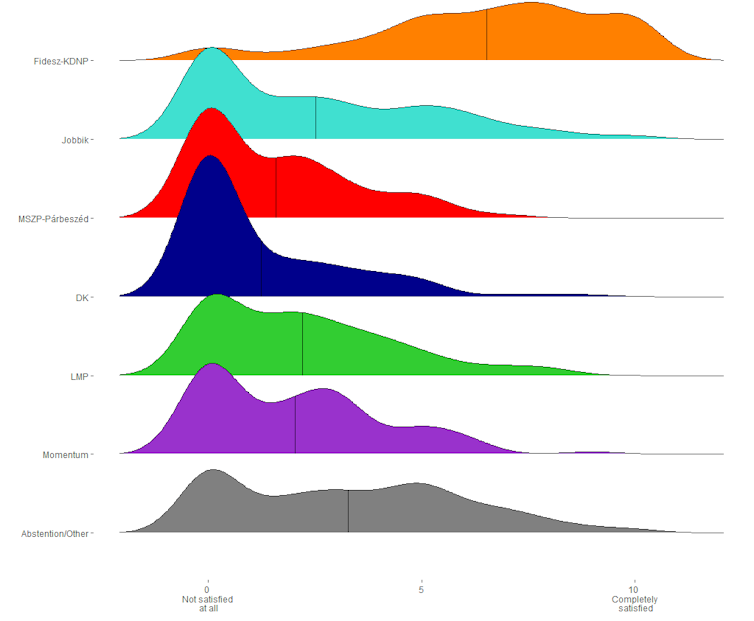Hungary’s ultra-conservative prime minister, Viktor Orbán, has preserved his two-thirds super majority in the country’s parliamentary elections. Orbán faced a coalition of six major opposition parties, who made the historic decision to run together under the United for Hungary coalition.
Participating parties spanned the political spectrum, including the green LMP (Magyarország Zöld Pártja), the social-democratic MZSP (Magyar Szocialista Párt) and DK (Demokratikus Koalíció), the liberal Momentum, and the far right Jobbik party. The results of the election serve as a lesson on why opposition parties need to be careful about who they partner with to topple a leader like Orbán.
This coalition of strange bedfellows was led by Péter Márki-Zay, a Christian conservative independent politician who, in 2018, became the mayor of the town of Hódmezővásárhely after receiving the support of a similar coalition.
Orbán’s Fidesz party won by a significant margin, while the United for Hungary opposition coalition received just 35% of the vote. This was down 11.5 points compared to the total support received when the coalition partners ran separately in 2018.
While Orbán’s victory is conclusive, these elections took place on an uneven playing field that benefits Fidesz. Orbán and his circle have the control of the overwhelming majority of the media. During the election campaign, opposition parties were only granted five minutes of television air time – the legal minimum. Fidesz has also used government funds and platforms for its political campaign, including sending political messages to people who had signed up for COVID jabs.
The election results give Orbán’s party a free hand to change the constitution and appoint any state officials, allowing him to continue in his illiberal democracy project. Currently, no major democracy index, including those from the Varieties of Democracy Institute, the Economist and Freedom House classify Hungary as a full democracy.
A look at the opposition support from 2018
Our data from the ProDem project – a research project looking at how democracy has changed in Europe – shows that the United for Hungary ticket did not motivate voters equally across parties.
With the public opinion company YouGov, we surveyed 2,051 Hungarians between February 21 and March 3, asking them about their previous and planned vote. Overall, we found that one-third of those who voted for opposition parties in 2018 did not plan to support the coalition in the 2022 elections.
Read more:
Viktor Orbán: Hungary’s controversial authoritarian prime minister secures yet another term in national election
Supporters of the two social democratic parties, MSZP and DK, seemed to be the most convinced about the United for Hungary ticket. But this was not the case for all opposition backers. A whopping 29% of people who declared to have voted for Momentum in 2018 and 26% of people who voted for LMP that year said that they planned to abstain in 2022.
The least keen were supporters of the far right Jobbik party – only one in two planned to vote for the coalition when we surveyed them. Moreover, 15% of Jobbik voters planned to vote for the far right Our Homeland movement (Mi Hazánk), which splintered off from Jobbik in 2018. This probably explains the surprising performance of this new party in the elections – Mi Hazánk received 6.3% support and will be represented in parliament for the first time, with seven seats.
Transfer from 2018 vote to voter intention 2022
ProDem project, Author provided
The efforts to accommodate Jobbik in the United for Hungary project prevented opposition parties from having a comprehensive policy agenda, limiting their message to opposing Orbán and the blatant corruption of his government. As our data found, notable proportions of Jobbik supporters disagree with the rest of the coalition’s voters on central issues in Hungarian politics.
One such issue is LGBTQ+ rights, which Orbán has worked to oppose as part of his policy agenda. We asked survey respondents about one particular issue, that of whether same-sex couples should be permitted to adopt children. Our data found that while fewer than 10% of supporters of most of the opposition parties were opposed to this policy, this proportion is three times bigger among voters who supported Jobbik in 2018.
Opposition voters on LGBTQ+ rights

ProDem project, Author provided
Similarly, a sizeable proportion of Jobbik voters see migrants less favourably than supporters of the other opposition coalition parties. Our data found that 34% of Jobbik voters agree with the statement that migrants make Hungary a worse place to live, while only an average of 15% of supporters of other parties shared that view.
Opposition voter attitudes towards migrants

ProDem project, Author provided
The European Union was another key issue in this election. While a majority of those who voted for MSZP, DK, Momentum and LMP in 2018 broadly trust the EU, this is not the case of Jobbik supporters, who tend to be more eurosceptic. While, across the rest of opposition party voters, the proportion of those who distrust the EU is below 20%, over 40% of Jobbik voters do not trust European institutions.
Opposition supporters on trust in the European Union

ProDem project, Author provided
Should the opposition remain united?
The opposition’s coalition strategy seems to have been a failure. However, Hungary’s electoral laws are very punishing on smaller parties. Out of the 199 seats in parliament, 106 are in winner-takes-all constituencies. The remaining 93 seats are assigned through national party lists, where only parties who register candidates in at least 50 electoral districts qualify. A divided opposition would be less competitive in electoral districts and smaller parties with few organisational capacities outside cities would struggle to register enough candidates to run for the national party lists.
In the future, the opposition could consider restricting its coalition to parties whose voters are more like-minded, leaving Jobbik out. Excluding Jobbik would not only avoid the thorny issue of incorporating a far right party in a pro-democratic coalition. It would also potentially allow the coalition to be led by somebody who, unlike Márki-Zay, is more aligned with the liberal social values of its prospective voters.
While an independent Jobbik is unlikely to take a substantial proportion of votes from the coalition, it can seduce some Fidesz supporters who are concerned with the democratic backsliding in Hungary but still oppose the politics and scandals of the 2006-2010 socialist government led by Ferenc Gyurcsány. Our ProDem data shows that Hungarian citizens are concerned about the state of democracy in their country, including those who planned to abstain from the 2022 election, and some Fidesz voters.
Hungarian voters on the state of democracy

ProDem project, Author provided
Since Orbán and the Fidesz party took power in 2010, they have built an illiberal democracy in Hungary that has undermined electoral competition and fairness. The future of the Hungarian opposition will likely benefit from continued cooperation, only if they stop trying to include the far right.
![]()
Felipe G. Santos receives funding from the Volkswagenstiftung, a private research funding foundation that is not affiliated to the car manufacturer, the Volkswagen Group.
Dan Mercea receives funding from the Volkswagenstiftung, a private research funding foundation that is not affiliated to the car manufacturer, the Volkswagen Group.











